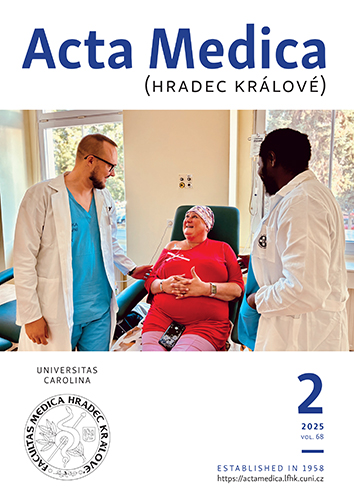ACTA MEDICA, Vol 66 No 1 (2023), 11–18
Wireless Monitoring of Gastrointestinal Transit Time, Intra-Luminal Ph, Pressure and Temperature in Experimental Pigs: A Pilot Study
Jan Bureš, Věra Radochová, Jaroslav Květina, Darina Kohoutová, Martin Vališ, Stanislav Rejchrt, Jana Žďárová Karasová, Ondřej Soukup, Štěpán Suchánek, Miroslav Zavoral
DOI: https://doi.org/10.14712/18059694.2023.9
zveřejněno: 26. 06. 2023
Abstract
Background: There is no single gold standard for investigation of gastrointestinal motility function. Wireless motility monitoring involves a novel concept which provides a complex information on gastrointestinal function (gastrointestinal transit time, intra-luminal pH, pressure and temperature). Gastrointestinal motility functions of experimental pigs are very similar to those of humans. That is why porcine studies have already provided suitable experimental models for several preclinical projects. Aims: The aim of our study was to adopt methods of non-invasive wireless monitoring of gastrointestinal functions in experimental pigs. Methods: Five experimental adult female pigs were enrolled into the study. Wireless motility capsules were delivered into the porcine stomach endoscopically. Gastrointestinal transit and intra-luminal conditions were recorded for five days. Results: Records of animals provided good (3 pigs) or very good quality files (2 pigs). 31150 variables were evaluated. Mean time of the presence of capsules in the stomach was 926 ± 295 min, transfer of a capsule from the stomach into the duodenum lasted 5–34 min. Mean small intestinal transit time was 251 ± 43 min. Food intake was associated with an increase of gastric luminal temperature and a decrease of intra-gastric pressure. The highest intra-luminal pH was present in the ileum. The highest temperature and the lowest intra-luminal pressure were found in the colon. All data displayed a substantial inter-individual variability. Conclusions: This pilot study has proven that a long-term function monitoring of the gastrointestinal tract by means of wireless motility capsules in experimental pigs is feasible. However, both ketamine-based induction of general anaesthesia as well as long-lasting general anaesthesia (> 6 hours) should be avoided to prevent retention of a capsule in the porcine stomach.
klíčová slova: acetylcholinesterase inhibitors; experimental pigs; gastrointestinal transit time; intra-luminal pH; pressure and temperature; oncology; toxicology; wireless capsule monitoring

Wireless Monitoring of Gastrointestinal Transit Time, Intra-Luminal Ph, Pressure and Temperature in Experimental Pigs: A Pilot Study is licensed under a Creative Commons Attribution 4.0 International License.
210 x 297 mm
vychází: 4 x ročně
cena tištěného čísla: 150 Kč
ISSN: 1211-4286
E-ISSN: 1805-9694
